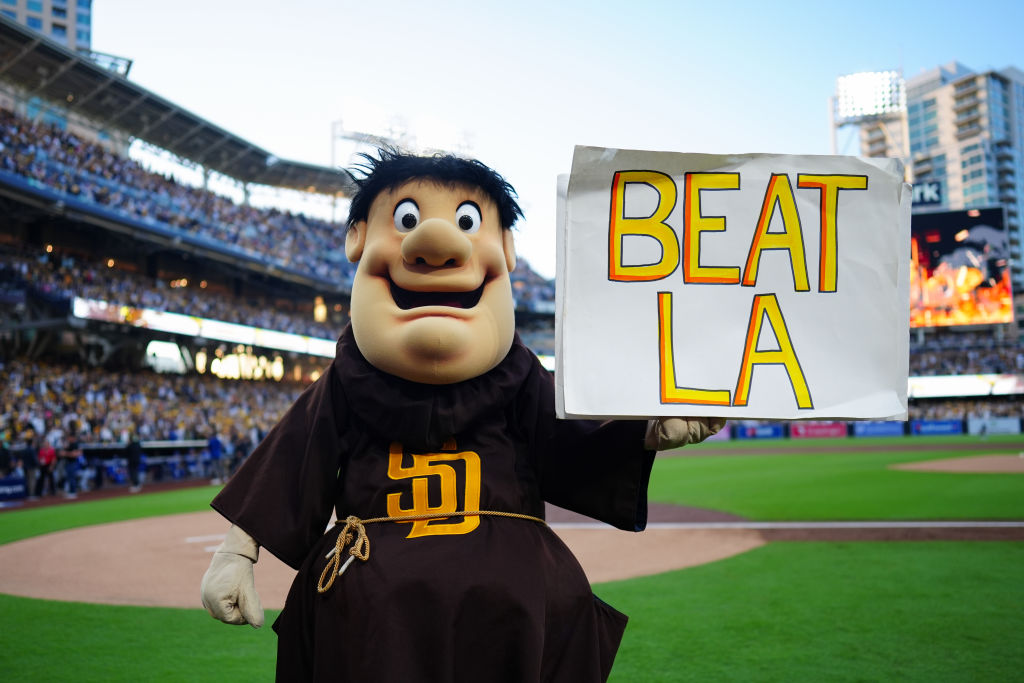As much as the MLB postseason is about which team can rack up the most consecutive series wins in a pressure-packed month, I can't help but also see it as a bit of a Baseball Pageant, in which each city indirectly competes to prove that they have the most charming and lovable and deserving group of boys. Most of the remaining franchises have a little flower they can offer to the neutrals, something that says Hey, wouldn't you like to see these sweeties succeed? As best I can tell, their claims are as follows:
- The Mets are rallying behind absurdist lucky charms like a purple blob and a pumpkin
- The "gritty Tigs" keep manufacturing clutch hits right when they need them
- The Phillies are basically the Himbo Brigade
- The Dodgers lead off with the best-liked man in the sport, making his playoff debut
- The Guardians have exceeded all expectations with a rookie manager who's not afraid to cry
- The Royals are playing against the Yankees
Against this backdrop of feel-good stories and quirky masculinity, the San Diego Padres stand out. Their postseason has been less "charm offensive" and more just "offensive"—at least if you're a certain kind of baseball person primed to see disrespect everywhere you look. Dominating the conversation in the build-up to Game 3 on Tuesday was the "sinister sling" controversy, in which Manny Machado stood accused of throwing a ball toward the Dodgers dugout with an intent that was "unsettling," according to L.A. manager Dave Roberts. The dramatic cop-speak with which ESPN's report on the incident begins gives an indication into how agitated some people are about this:
SAN DIEGO -- The baseball that San Diego Padres third baseman Manny Machado threw toward the Dodgers' dugout Sunday night -- triggering another heated back-and-forth between him and Los Angeles pitcher Jack Flaherty -- landed in the vicinity of Dodgers manager Dave Roberts.
There's a video from ESPN, too. If you look closely and squint, you can just make out that someone is on a field throwing a baseball. Dave Roberts's vicinity remains ambiguous.
With all of this nonsense, self-inflicted or otherwise, beginning to boil over, the Padres came back home for Game 3 ready to fight for a series lead. The final score was a stressful 6-5, but as San Diego gathered all of its runs in one haymaker of a second inning against a wobbly Walker Buehler, they showed more screw you than any other October roster. Manny Machado put his head between Freddie Freeman and his throwing target to force a rally-starting botch. Jackson Merrill battering-rammed his way into second base to break up a potential double play. And Fernando Tatis Jr. hit what may stand as the series-defining dinger—a defiant sockdolager that gave San Diego their fifth and sixth runs, and ignited a crowd that watched it soar right along with him.
It was the crowd, too, that provided an emotional backdrop for Tatis's explosive celebrations in right field after Robert Suarez secured the save with a strikeout.

I've been to the Padres' park once, during a holiday Sunday afternoon all the way back in 2010. I got to see Tony Gwynn Jr. earn a walk-off hit—a fact my father and I would later get to share with Gwynn's dad during a Hall of Fame weekend in Cooperstown—but I remember the atmosphere in the stands being about as mellow as the weather. The lesson I took from that is, I think, fairly logical: There are better things for people to do on a nice day in San Diego than go to a baseball game.
In my head, as the Padres stumbled through the 2010s, they remained an inessential add-on to a city with plenty of non-sports fun to offer. Peter Seidler's ownership tenure gradually ramped up spending to match his desire to win and turned the Padres into a trendy item, but in this season, after Seidler's death and the subsequent shedding of payroll, I've been consistently wowed by San Diego crowds. Not only are they loud, but the people in the most expensive seats actually sit in them and watch the games. The devotion here is undeniable, but I think this spike in passion has worked to make the Padres a little more insular, a little more combative, than some of the clubs with a longer history of success and/or a wider base of casuals. The Dodgers, in particular, are the ice to their fire: the division-hogging elitists, the ballpark-hijacking neighbors, the fragile choke artists who beg for protection from limply tossed baseballs. Who wouldn't feel spiteful after generations spent in their shade? What peasant wouldn't root for the downfall of baseball royalty?
I'm just asking questions. But in a postseason that's been filled with a lot of awwwws, there's an edge to the Padres that, when coupled with the victories, commands a different kind of respect. The Dodgers have shrunk by comparison. None of the postgame quotes from L.A. gave the impression that this group is prepared to fight tooth and nail for their season, not even their iconic 50/50 hero:
“Overall, I really do feel this team really wants to win. That’s the feeling I get,” said Dodgers designated hitter Shohei Ohtani through interpreter Will Ireton. “Tomorrow, I’m going to go out there and do my best.”
The Padres really want to win, too. The difference is that they also want to make it hurt.






